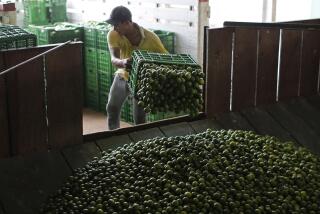U.S. Forces Train Bolivians to Fight Drug Traffickers : South America: Americans are there in a noncombat role. But hackles are raised over militarization.
LA PAZ, Bolivia — In the Bolivian heartland of South America, Special Forces from Ft. Bragg, N.C., have established the biggest U.S. military presence on this continent.
The American soldiers are strictly limited to their role as trainers, but they play a key part in a controversy over the so-called “militarization” of Bolivia’s campaign against cocaine trafficking.
The controversy crackles and flares with suspicions of official corruption, fears of bloody conflict and allegations of Yankee imperialism.
By sending the Army trainers, Washington hopes to show progress in cooperative efforts to cut off cocaine at its South American source. But the chances of success seem iffy and the risks of backlash considerable.
Bolivia and neighboring Peru produce most of the world’s coca leaves, the raw material of cocaine. After years of failed efforts to reduce the supply, the Bush Administration is pushing the use of military troops against traffickers.
The idea is controversial in Bolivia, where the army has a record of corruption and abuse of civilian rights. Nevertheless, Washington offered Bolivia a total of $46 million in military aid if the army would join the anti-drug war.
After much hesitation, President Jaime Paz Zamora agreed. And on May 6, a 56-man team from Ft. Bragg began 10 weeks of basic training for a Bolivian army Ranger battalion of 450.
Another team from Ft. Bragg is scheduled to arrive in September to train a second army battalion, and the United States also is planning to train and supply Bolivian transport and engineering battalions.
The first training site is a Ranger base north of Santa Cruz, 550 miles east of La Paz. For several years, smaller teams of U.S. Special Forces have been training Bolivian anti-narcotics police in the coca-rich Chapare region, about halfway between La Paz and Santa Cruz.
That police force, called the Leopards, has sometimes clashed with hostile peasant farmers who sell coca to traffickers. Bolivians who oppose “militarization” predict that conflicts with army troops will intensify.
“We don’t believe they are being trained to combat narco-traffickers as they say, but instead this is an open declaration of war against campesinos who produce coca,” said Secundino Montevilla, who is “secretary of conflicts” for the Confederation of Campesino Unions.
The leftist confederation is threatening to block roads around the country June 17 in protest against the U.S. military presence and the “militarization” of the drug war.
Confederation leaders also have warned that coca farmers will use arms to resist the army. “The military pressure will provoke a clash,” said the 32-year-old Montevilla.
He spoke in the confederation’s shabby office in downtown La Paz one afternoon last week. That evening, a few blocks away, university students gathered in a lecture hall to hear one of a series of forums being held on the “militarization” issue.
“Militarization is going to drag Bolivia into what is happening in Colombia and what is happening in Peru,” said Filomeno Escobar, a labor representative in Bolivia’s Congress and one of the forum’s speakers. So far, Bolivia has been spared the kind of guerrilla violence in coca-growing areas that troubles Peru and the “narco-terrorism” that has plagued Colombia.
Congressman Leopoldo Lopez, a member of President Jaime Paz Zamora’s center-left party, argued that military force against drug traffickers is justified because the traffickers are armed and dangerous. “A bellicose power can be confronted only by another bellicose power,” Lopez said.
Congressman Gregorio Lanza, a member of the leftist opposition, said: “My fear is that it (militarization) will be a failure; then the Americans will say that this is a failure so American troops must come in.”
Officials say that Bolivian army troops will be used only sparingly when needed as backup for anti-narcotics police. The rest of the time they will be on military bases, away from the temptations of corruption, the officials say.
A Bolivian editor said some army officers are eager for corruption. “The military looks with envy on the police because it is easy for them to enrich themselves with the corruption of drug trafficking,” the editor said.
Communications Minister Mario Rueda told The Times that army troops will take no action against coca growers.
A Latin American diplomat in La Paz said any clash with campesinos “would have very serious consequences, because the campesinos are a very strong political force.”
The diplomat suggested that even if the military participation has little impact on the drug war, it is in the interest of both the United States and Bolivia. The American training and aid gives the United States an important channel of military influence in Bolivia, and the aid is badly needed by the Bolivian army, the diplomat concluded.
More to Read
Sign up for Essential California
The most important California stories and recommendations in your inbox every morning.
You may occasionally receive promotional content from the Los Angeles Times.










